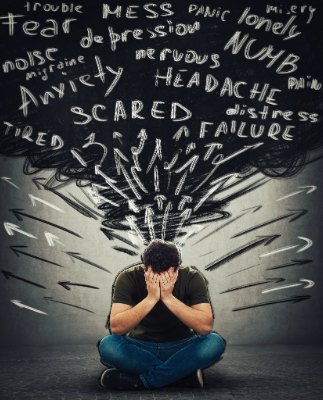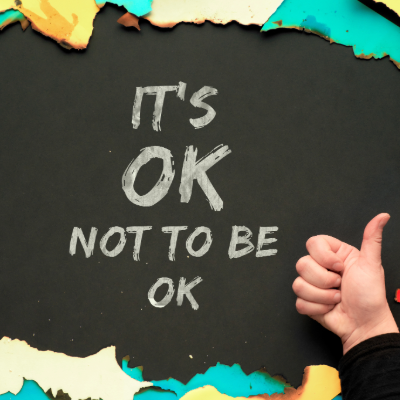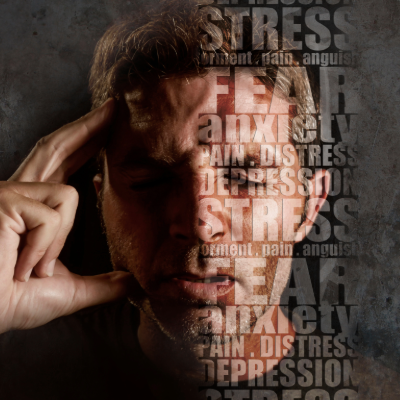


MORE THAN 1 IN 5 INDIVIDUALS STRUGGLE WITH MENTAL HEALTH
We can change the numbers .
Anxiety and depression. Two words that carry immense weight, often shrouded in stigma and misconception. They are not simply “bad moods” or fleeting feelings. They are complex mental health conditions that can significantly impact an individual’s thoughts, feelings, behaviors, and overall quality of life.
In a world that often prioritizes physical health, it’s crucial to shine a spotlight on mental well-being and increase awareness around anxiety and depression, offering information, support, and actionable steps towards prevention.
Why Awareness Matters
According to the World Health Organization (WHO), depression affects more than 280 million people worldwide, and anxiety disorders affect an estimated 301 million pe ople. These numbers represent people we love, our neighbors, friends, coworkers, brothers, sisters, parents. The statistics paint a sobering picture. but together we can change these numbers.
NORMALIZE THE CONVERSATION
Openly discussing mental health makes it easier for individuals to acknowledge their struggles and seek support.
NO JUDGEMENT OR DISCRIMINATION
Education helps dispel myths and misconceptions, fostering a more understanding and compassionate environment.
ENCOURAGE HELP-SEEKING
When people understand that anxiety and depression are treatable conditions, they are more likely to reach out for professional help.
KEEP AN OPEN MIND
We often don’t know or comprehend the anxiety or depression that an individual may be experiencing. It’s crucial to maintain an open mind and consider their personal circumstances.
Immediate and free mental health support
It’s easy to feel overwhelmed, however, reaching out saves lives, and the Mental Health Hotline offers the compassionate ear of a professional who understands how to handle a mental health crisis. Sometimes, a brief conversation can help put things into perspective and guide you forward.
Proactive Steps for Mental Well-being
While anxiety and depression can be triggered by a variety of factors, including genetics, environment, and life events, there are several proactive steps individuals can take to promote their mental well-being and potentially prevent the onset or severity of these conditions.
PRIORTIZE SELF-CARE
Engage in activities that bring you joy and relaxation such as spending time in nature, practicing mindfulness or meditation, reading, listening to music, or pursuing hobbies.
CREATE STRONG CONNECTIONS
Build and maintain supportive relationships with family and friends. Talking to trusted individuals about your feelings can provide immense comfort and perspective.
REGULAR PHYSICAL ACTIVITY
Exercise is a powerful mood booster. Even a short walk can release endorphins, reduce stress, and improve overall well-being.
MAINTAIN A HEALTHY DIET
Nourishing your body with a balanced diet can positively impact your mood and energy levels. A healthy body can lead to a healthy mind.

ENSURE ADEQUATE SLEEP
Sleep deprivation can exacerbate irregular sleep patterns, anxiety and depression symptoms. Aim for at least 7-9 hours of quality sleep per night.
MANAGE STRESS EFFECTIVELY
Identify your stressors and develop healthy coping mechanisms. This might involve time management techniques, deep breathing exercises, or seeking professional guidance.
LIMIT EXPOSURE TO TRIGGERS
Be mindful of media consumption and social media use, as these can sometimes contribute to feelings of anxiety and inadequacy.
RECOGNIZE THE WARNING SIGNS
Educate yourself about the early signs of anxiety and depression. This will allow you to seek help sooner if you notice these symptoms.
Seeking Help: When to Reach Out?
It’s essential to remember that seeking professional help is a sign of strength, not weakness. If you are experiencing persistent symptoms of anxiety or depression that are interfering with your daily life, don’t hesitate to reach out to a mental health professional.

TALK TO YOUR DOCTOR
Your primary care physician can provide an initial assessment and refer you to a mental health specialist.
CONNECT WITH A THERAPIST
Therapists can provide individual or group therapy to help you develop coping skills and address underlying issues.
CONSIDER MEDICATION
In some cases, medication may be necessary to manage anxiety or depression symptoms. A psychiatrist can evaluate your situation and recommend appropriate medication if needed.
UTILIZE THE CRISIS HOTLINE
If you are experiencing suicidal thoughts or are in immediate distress, call a crisis hotline or seek emergency medical care.
The Power of Collective Action
Creating a more supportive and understanding society requires a collective effort. By promoting mental health awareness, challenging stigma, and providing access to resources, we can empower individuals to prioritize their well-being and seek help when they need it. Let’s work together to break the silence and create a world where mental health is valued and prioritized for all.


